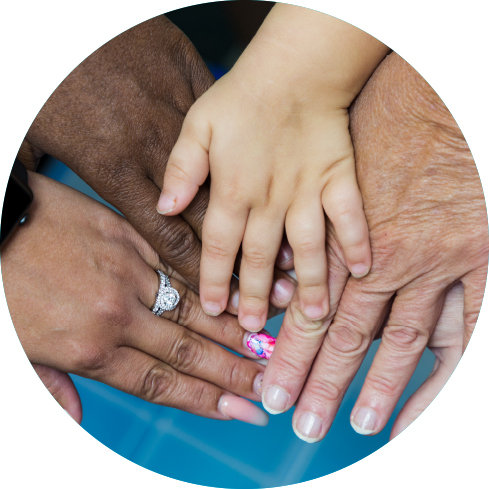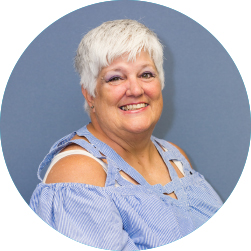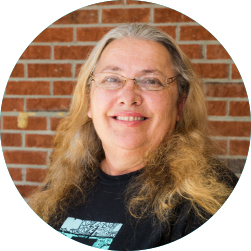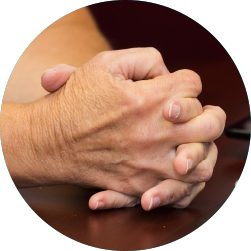The impact of the opioid crisis extends far beyond the individuals who use opioids and, oftentimes, other drugs. The crisis includes what can be considered collateral damage, impacting community resources including health care, public safety, and educational systems. Closer to home, however, the opioid epidemic takes a toll on families, on the people who love and support drug users as they struggle with addiction and the inevitable destruction in its wake. Spouses and parents are among the most affected, often taking on more responsibility in their own lives as the effects of opioid use and addiction disable users and wreak havoc in the homes and relationships surrounding this epidemic.
I spent several hours with a group of grandparents in Harnett County, all of whom are raising grandchildren as a result of their children’s opioid use. This means grandparents face not the retirement they planned (with cross-country vacations and trips to Disneyland) but one of financial, emotional and legal strain, a retirement of constant work, worry, stress, and, ultimately, love. In North Carolina, the Sandhills region (Bladen, Columbus, Cumberland, Hoke, Montgomery, Moore, Richmond, Robeson, Sampson, and Scotland Counties) has the highest rates of grandparents as primary caregivers as well as the highest rates of opioid prescriptions written. During my time with the grandparents in Harnett County, I learned exactly what that caregiving looks like and what life means for the people who have become safe havens for the littlest victims of this epidemic.

Safe Havens: Grandparents Raising Grandchildren in America’s Opioid Crisis
Sixty-one-year-old Linda Sunderman leans over and settles her granddaughter with an iPad and headphones before turning to say, “I think it’s worse for the family than it is for the drug addict.”
Sunderman has been raising her granddaughter since the baby’s birth and has had legal custody since she turned 2-years-old. She explains, “I had to get custody. I went the route of CPA and all that kind of stuff, and then my son – he has some mental issues and he’s the father of the child – he got mad at something the mother of the child did and cut his wrists. He sent the pictures to the other mother and he tried to come to get the baby. The mother was living in a hotel with different people at the time. She was bad on drugs then. So I had to get custody.”
It’s a story I hear, in various detail, from each of the grandparents willing to be interviewed, most of whom are members of a family caregiver support group run through the Department of Aging in Harnett County.
Sunderman describes the toll addiction takes on the families, not only in terms of grandparents raising (often unexpectedly and overnight) their grandchildren but also the intensity of circumstances surrounding this particular caregiving situation. “When she [the mother] left for Iowa, she’d stolen her drug dealer’s meth. The drug dealer was threatening us, threatening to hurt M. [granddaughter] to get back at the mom for stealing from them. We had to have the police drive by the house every day. We had to stay in the house, not even go in the yard. That’s why it’s harder for the family. The mom – she could get on a bus and leave.”
Several of the grandparents nod in acknowledgment of Sunderman’s story. Ms. T., a fifty-five-year-old grandmother raising her grandson, says, “I woke up with a nightmare this morning that he was abducted this morning. You go to the schools. You don’t blink. You don’t take your eyes off them.”
The worry of safety and security aren’t the only concerns grandparents face when caring for their grandchildren as a result of the opioid epidemic and addiction. Linda Sunderman worries about money, which she says is often in short supply. “When I went to get food stamps [after receiving custody of her grandchild] I was getting $912 in disability, so I didn’t qualify for food stamps. I only qualified for $16 a month.” Grandparents talk about struggling to provide school supplies, clothing, food, and other necessities let alone extravagances. Even the cost of counseling, which is provided for the children through Medicaid, can be too much. In Sunderman’s case, there were no counselors in her family’s city, and the drive to reach a counselor would have meant more in gas than her family could afford. “When I was only getting $900 a month, the gas money was too much.” Add to this the cost of legal fees for custody issues, which can be sizeable, and many of the grandparents are struggling to get by during a time they planned to enjoy their golden years and retirement funds.

Even beyond the financial cost and constant worry, however, there are still more burdens grandparents must face while raising their grandchildren, particularly those who come to them as a result of addiction and the issues often linked with drug use. Many of the children have witnessed or been victims of violence and abuse. Laura Blackwell, 57, says, “Mine [her grandson’s parents] were physically fighting in front of M. [grandson]. It’s by the grace of God that M. never got hit. When you’re using, anything could happen. Mom and Dad would fight, and I was so afraid M. would get hit. He witnessed so much ugliness and violence. When we got him, he had such a hitting problem.”
Ms. T. says, “C. [grandson] had to move 15 times before he was three. He was in flophouses…you name it.”
These experiences mean the children often come to their grandparents with trauma, which can be difficult in terms of behavior issues and extra needs on the part of the children. One grandparent, who asked to remain anonymous, said her biggest fear is “…that we will be enough to make up for the pain and trauma and they [the grandchildren] will know they are safe and loved.”
Another fear many grandparents face is the issue of what might happen to their grandchildren if they, the grandparent and caregiver, become ill or even die. Latorius Adams, Family Caregiver Support Program Specialist and Medicare Counselor with Harnett County, says, “In my support group, I have a few grandparents who are sick or who die. What is the plan if the grandparents die?”
Ms. T. agrees. “That is my biggest fear. What happens if I die? Where will he [my grandson] go? One grandparent is dead. The rest are on pills. Where will he go?”
Adams continues, “Some of these people in my program are great-grandparents. That’s it for some of these families. And a lot of these people are sick.”
This is another aspect of grandparents raising grandchildren that are often overlooked: grandparents themselves are sick, dealing with chronic health issues, or needing care themselves.
Ms. T. lives with diabetes, and for her grandson, she’s the end of the line in terms of support. She says, “That’s it for him. I’m it. He helps me with my diabetes. When my sugar gets low, he knows what to do.”
Laura Blackwell says, “One of the hardest things for us is that we can’t physically do the things I want to do with my 8-year-old. We can’t get out and play with them like a young parent can. I hate that.”

Sunderman agrees. “I had a knee replacement. I wish I could win the lottery and be able to do a little more. Anyway, you gotta play the lottery to win it.”
The room breaks into laughter, a moment of much-needed lightheartedness before I ask the group: As a community, we often focus on helping people with the disease of addiction. Are we doing enough to help the families?
Sunderman is quick to speak. “No. It’s a big no. You can capitalize on that one. People don’t know the impact it’s having. People think you should be able to just put them in rehab and recovery.”
Ms. T. agrees. “My daughter-in-law was in recovery and dealing [drugs] in the parking lot. She just goes right back to it.”
I ask if this is how any of them envisioned their retirement years, and there is laughter again but this time it is tinged with sadness and a touch of bitterness. Ms. T. tells me she was supposed to be on the road during retirement, seeing the country for free. She was supposed to leave for her big cross-country trip in August, but in July of that year, her daughter-in-law left her grandson in a car on a hot summer day.
“All our plans stopped. Definitely not how I thought. We should be taking them to Disneyland.
We don’t get to be grandparents, not really. We have to discipline them. We have to be mom, dad, grandma. All of it.”
Finally, with great trepidation, I tell the group that I’ll be publishing this article for the November issue, the theme of which is gratitude. I ask: What are you most grateful for in this situation?
The answers, like all of the women, are strong, resilient, loving, and true.
Ms. T. says, “That I was financially able to step in and do what I was able to do because, without money, I couldn’t have done it.”
Blackwell says, “For me, it is that I was able to, with my background [of addiction], that I was able to be the parent I should have been but couldn’t for my kids, that I can be that for my grandson.”
Sunderman says, “Like Ms. T…if I hadn’t been hard at work if I hadn’t had a little money, that I’m able to be at home, that I have the time that I do with her.
We live in love, but we are happy.”
Ms. T. puts in a final note. “We’re all probably grateful that our grandchildren were strong enough to survive until we could get them. They had to be strong to survive what they went through.”

Spouse Spotlight
Bruce, 48
As a young man and newly-divorced father, Bruce found himself in a new town with a fresh start. Having kicked his own demons of addiction with alcohol, he met a girl who was “pretty, smart, and motivated. She was a CNA working on her RN and liked my dumb jokes.” She liked having a good time, including smoking pot, which was fine with him. Alcohol had always been Bruce’s ‘problem of choice.’ But within a few years, with a baby of their own, the signs that something was wrong began to appear. Bruce shares with ONC what it was like for him, as a significant other, to navigate the murky waters of addiction.
Amy Phariss: So, you met her. How long before you married?
B: We never got married, but we had a baby a year-and-a-half into it. It started out that she’d work late. She wouldn’t come home until midnight.
Because you want to give someone their space, you don’t ask questions right away. You don’t accuse them of using drugs.
But she’d get paid and her money would be gone. She always had excuses. By the time the baby was two, there were some nights she didn’t come home.
AP: Did you know at that point?
B: I guess that’s the crazy thing. I felt like I was a man of the world, so I thought I would be able to see something like that happening in front of me. I thought maybe she was seeing someone else. Maybe she didn’t’ want to be with me. It was crazy, like a bi-polar thing. She was one person one hour and then another hour she was another person. Once it really started manifesting, I got scared. I realized I couldn’t see it. Maybe it was because I was so close to it I couldn’t see it.
AP: You were her partner, her spouse. How did you not know?
B: First of all, they (drug users) develop a secondary fiction, a story that’s taking place, and they even start to believe it, but it’s like you sit there and you wonder…and again, I should have known…and maybe if she wasn’t my significant other, I could have seen it. But she was a nurse and had access to meds. She jeopardized herself, our relationship, the welfare of the baby….and none of that mattered as much as catching a buzz. Realizing that and accepting that was the hardest thing. I wanted to help her. I wanted to figure it out. I really cared about her.
I really do believe shame consumed her. I think that’s why she could never get back up. Shame is such a volatile part of that recipe of addiction, getting sucked into that. Once you’re in, I don’t know. I’m certainly not an expert, but I imagine if you can slay the dragon of shame, you can repair the rest of the person.
AP: What would you say to someone in your shoes, to someone with a spouse struggling with addiction?
B: That’s a tough one. There’s a part of me that says: Run! Runaway. It’s okay to give up.
Then there’s another part of me that says: hang on until you can’t hang on. Give them a reason to quit. Give them a reason to do better.
In the end, that’s all we can do, right? Give them a reason to do better.
Amy, 24
Two years ago, Amy made the call no young wife wants to make. She called 911 because her husband, who had a history of drug use and overdose, was not responding to her text messages and was home alone with their infant daughter. By the time Amy was on her way to the couple’s home, the police called to inform her that her husband, Alex, was dead. We first heard Alex’s story back in September when we published an interview with Alex’s mother, Stephanie. Amy reached out to OutreachNC to clarify details and sat down with ONC’s editor in chief Amy Phariss for an honest, tough, heart-wrenching discussion about her experience as the wife of a man she remembers as shy and quiet but also goofy, a man who harbored insecurities and sadness but also sang to her in the car, danced with his daughter and wanted nothing more than to make his family proud. From the view of a spouse who not only lived alongside addiction but visits the grave of the husband it took, Amy offers us insight into how it feels to battle addiction alongside a loved one, as a mother and wife.
Amy Phariss: What would you say to someone in your situation, a spouse whose partner is struggling with addiction?
Amy: Leave. I can’t really give that advice because I didn’t do it, but I constantly tell people: leave and support them from a distance. That’s the healthiest way to do it. You can still have contact, but let them figure out what they want to do on their own. You can’t choose that for them. They have to do that on their own.
People asked me why didn’t I force him to go to rehab. But I couldn’t do it. I couldn’t handcuff him and make him go.
AP: What would you say to a parent of a child struggling with addiction?
A: Don’t give up. I think that’s a lot of parents’ problems – they give up on their child or push them away. Pushing them away only makes it worse. I saw that from Alex’s side. Nothing I would say would make him feel better. Just be there. You don’t have to enable it. You don’t have to make it okay. But be there and let them know you love them. They aren’t any different than anyone else. They’re still people. He was a father and a son and a brother. He was still that person.
AP: What is the line between enabling and loving?
A: I feel like enabling is almost what I was doing – knowing what they’re doing and acting like they aren’t. That’s a form of enabling. Loving is knowing they’re doing it. They know you know. They know you’re not okay with it. But you are still there, still, love them.
AP: Why didn’t you reach out for help?
I was embarrassed. When people hear you’re dating a drug addict, they don’t want to be around you. They think you’re just like him. I didn’t share his story. I said it was an accident for a long time. But the Dunn Police Department asked me to come and speak before they came to do raids. A lot of the officers were in tears to hear about it from the family side, to hear how it affects us.
AP: Why do you think people start using drugs? Why did Alex begin using drugs?
A: I think people get so depressed. Alex felt like he finally fit in somewhere, with these drug users and dealers. They talked to him. Even if it was just to sell him drugs or use it with him, they talked to him, kept up with him. He finally felt welcome.
The drugs got him out of his depression for however long the drugs stayed in his system. If he had a low day, he’d use. It made him feel better. I feel like he finally found his place….with the wrong people.
AP: What do you think is the biggest misconception about drug users?
That they’re any different than you and I. I feel like, when people see drug addicts, they think of them as some junkie, worthless person. They’re not. It can happen to anybody. People fail to realize that. I’ve lost friends because of Alex’s addiction when everything came out, and what I tell them is to not judge so quickly. It could be you or your kid or husband….one day.
They don’t choose to die. They use the drug first, yes. But after that, there is a chemical imbalance in their brain. I don’t think they choose to continue to get high.
AP: What is the biggest misconception about a drug user’s spouse?
A: That we’re bad people. When Alex died, I was questioned as if I was on drugs too. I even told the police to drug test me. I have not used it in my life. We’re treated like drug addicts too. I don’t like the way people treat drug addicts themselves. So many people in my group talk about how their families have almost disowned them because they’re in a relationship with a drug addict. What I tell people is: I can’t help who I fell in love with.
